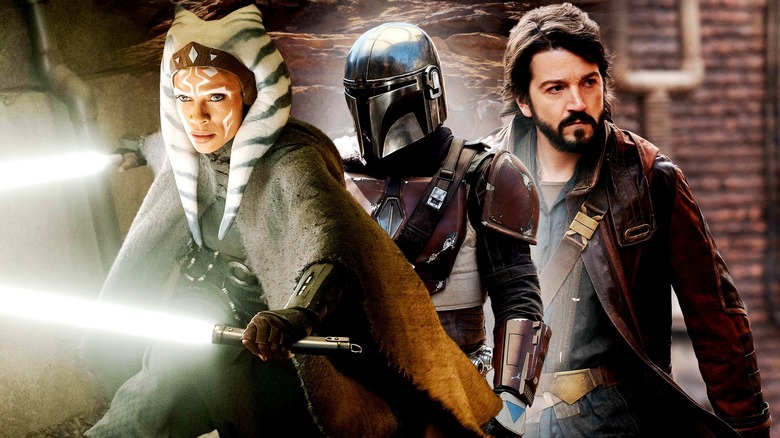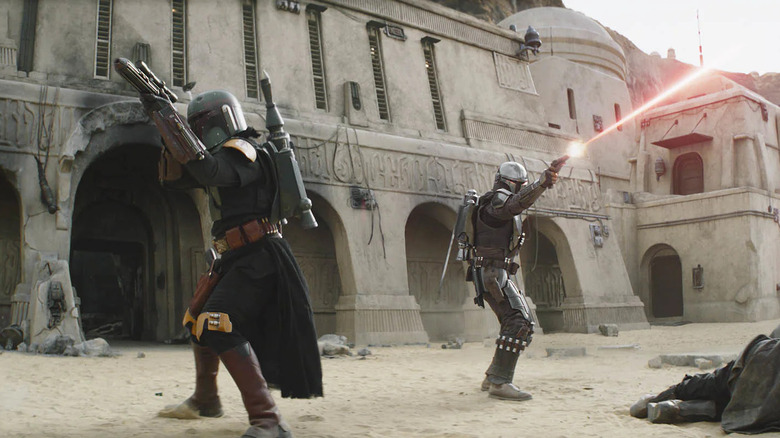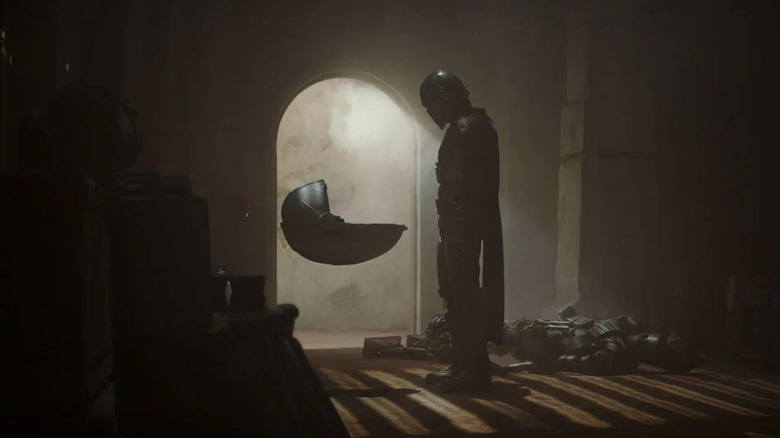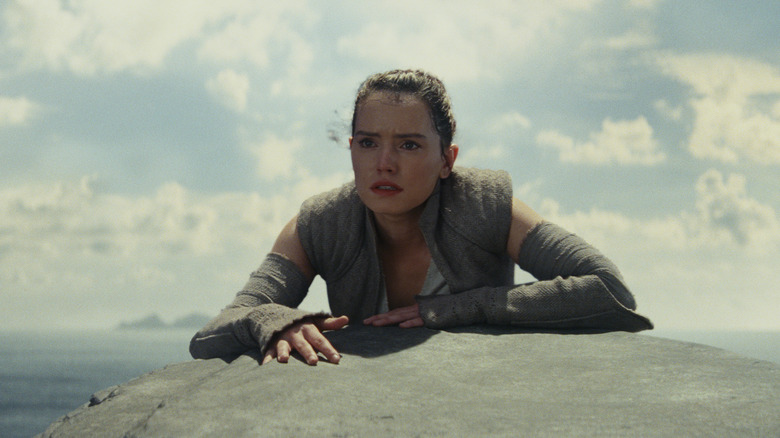The Mandalorian Wants Everything To Be Connected, And That's The Best Plan
The future of "Star Wars" under Disney is currently somewhat uncertain. We still don't know what the movies are going to look like over the next several years, even though many are currently in development (Star Wars Celebration should answer some questions in April). Is "The Bad Batch" going to last more than two seasons? What other animation is in development? There are many questions and few answers, but one thing we know for sure is that "The Mandalorian" isn't going anywhere, and the ever-growing universe surrounding that show is part of a larger plan.
Jon Favreau is the chief creative force behind the hit show, along with Dave Filoni, who previously earned the love of fans as the person responsible for "The Clone Wars" and "Star Wars Rebels." They are guiding the Mandoverse — for lack of a better name — and are doing so with a firm plan in place for where this is all headed. Speaking recently on the matter ahead of "The Mandalorian" season 3, Favreau said the following:
"Season 4, yeah I've written it already. We have to know where we're going to tell a fully formed story. We had mapped it out, Dave [Filoni] and I, and slowly you start to write each episode. I was writing it during post-production. All of it has to feel like a continuation and one full story."
That sounds very much like this is going to be a small-screen cinematic universe set within a galaxy far, far away. Fans may have mixed feelings on the matter, particularly those who don't want to see "Star Wars" become the Marvel Cinematic Universe. Be that as it may, this is almost certainly the best way to go for this corner of the franchise for a variety of reasons.
It's not all perfect
It's been clear for some time that "The Mandalorian" was not an isolated situation. "The Book of Boba Fett" was the first expansion of that universe, with shows like "Ahsoka," "Skeleton Crew," and an untitled event series on the way that all of these shows are presumably building toward. It's going to be like one of the Arrowverse crossovers on The CW, but for "Star Wars." And, you know, a much bigger budget, so Favreau's most recent comments on the matter are nothing new.
What has changed, however, is the fact that "The Book of Boba Fett" season 1 is behind us, and we've had some time to digest it heading into "The Mandalorian" season 3. What we learned from that show is that the level of connectivity between these shows isn't going to be tangential; it's going to be downright crucial. So much so that Boba Fett's supposed solo show ended up turning into "The Mandalorian" season 2.5 for a couple of episodes. This sort of connectivity is not something fans of this franchise are necessarily used to. The Skywalker saga is largely depending on the movies that came before, sure, but having an episode of one show sneakily exist inside of another show altogether is a messy prospect. Fans of "The Mandalorian" who skipped "The Book of Boba Fett" run the risk of being a little confused.
This is to say, it hasn't all been perfect. It's a somewhat risky tactic and one that doesn't seem to suit "Star Wars" as an overarching concept. It's a big galaxy, and it's probably best if the trilogies that come about work as trilogies on their own, and that the shows can largely be enjoyed on their own without having to watch every other show that comes out to understand what's going on.
This is the way: a plan is better than no plan
Can there be connective tissue? Absolutely! And there should be, but not so much so that it will hurt one show to have not seen another. "The Mandalorian" season 2 introduced us to Rosario Dawson's Ahsoka Tano, setting up the "Ahsoka" show. But there's seemingly no reason why someone couldn't watch "Ahsoka" even if they hadn't watched "The Mandalorian." That's the way this should work and, "The Book of Boba Fett" aside, hopefully, the way it will work in the future.
But even if there are some firm connectivity issues, Favreau and Filoni have proven their ability to tell satisfying stories in this universe. They clearly have a great understanding of "Star Wars" and the plan they have in place has produced far more good than bad. Filoni's output, in particular, is well worth taking into account. He kept the franchise alive with "The Clone Wars" in an otherwise quiet period, turning that show into something pretty remarkable by the time it wrapped up. Meanwhile, "Star Wars Rebels" is some of the best "Star Wars" ever of any kind. So sure, "The Book of Boba Fett" may have left something to be desired in the eyes of many fans, but there's no reason to think that's going to be the trend in the Mandoverse.
It's also important to note that this connectivity is not universe-wide. "Andor," which was widely heralded by fans and critics alike, is not directly connected to this corner of the universe in any way. Similarly, "The Acolyte" won't be either, with "The Bad Batch" also largely getting to exist on its own terms. Not to mention "Star Wars Visions" or "Tales of the Jedi." It's crystal clear that not everything at Lucasfilm must be connected — just what Favreau and Filoni have specifically planned.
Let us not forget the sequel trilogy
It might be easier to wag a finger and worry about the MCU-ification of "Star Wars" if the mandate seemed to be that everything from here on out is heavily tied together. For now, that doesn't seem to be the case. "Obi-Wan Kenobi" can do its thing while the publishing side can focus on "The High Republic." It all exists in the same galaxy. As has been the case with the expanded universe for decades now, fans can largely choose how much they wish to engage with.
Most importantly, having a plan is very clearly the way to go, simple as that may sound. Just look at what happened with the sequel trilogy, which kicked off very successfully with "Star Wars: The Force Awakens." Yet, despite being widely praised by critics, "The Last Jedi" remains arguably one of the most divisive blockbusters in history, which made things exceedingly difficult on "The Rise of Skywalker." Much of this messiness seemingly had to do with the lack of a firm plan in place for the trilogy. Am I saying things would have been out-and-out "better" if J.J. Abrams had mapped out a plan for the trilogy that Lucasfilm stuck to? Not necessarily, but it would have been less messy.
I think that's key when it comes to Mando, Grogu, Favreau, and Filoni. As it stands, these characters are incredibly popular, and "Star Wars" fans are largely on board for the ride. They are building to something specific and they are not flying by the seat of their pants. At the same time, other creators are allowed to explore other parts of the galaxy, at other points on the timeline. While we may look upon this differently once the Mando-verse reaches its eventual conclusion, for now, this is the way, as it were.
"The Mandalorian" season 3 premieres March 1 on Disney+.



